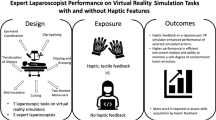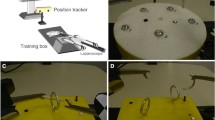Abstract
Background
In the acquisition of new skills that are difficult to master, such as those required for laparoscopy, feedback is a crucial component of the learning experience. Optimally, feedback should accurately reflect the task performance to be improved and be proximal to the training experience. In surgery, however, feedback typically is in vivo. The development of virtual reality training systems currently offers new training options. This study investigated the effect of feedback type and quality on laparoscopic skills acquisition.
Methods
For this study, 32 laparoscopic novices were prospectively randomized into four training conditions, with 8 in each group. Group 1 (control) had no feedback. Group 2 (buzzer) had audio feedback when the edges were touched. Group 3 (voiced error) had an examiner voicing the word “error” each time the walls were touched. Group 4 (both) received both the audio buzzer and “error” voiced by the examiner All the subjects performed a maze-tracking task with a laparoscopic stylus inserted through a 5-mm port to simulate the fulcrum effect in minimally invasive surgery (MIS). A computer connected to the stylus scored an error each time the edge of the maze was touched, and the subjects were made aware of the error in the aforementioned manner. Ten 2-min trials were performed by the subjects while viewing a monitor. At the conclusion of training, all the subjects completed a 2-min trial of a simple laparoscopic cutting task, with the number of correct and incorrect incisions recorded.
Results
Group 4 (both) made significantly more correct incisions than the other three groups (F = 12.13; df = 3, 28; p < 0.001), and also made significantly fewer errors or incorrect incisions (F = 14.4; p < 0.0001). Group 4 also made three times more correct incisions and 7.4 times fewer incorrect incisions than group 1 (control).
Conclusions
The type and quality of feedback during psychomotor skill acquisition for MIS have a large effect on the strength of skills generalization to a simple MIS task and should be given serious consideration in curriculum design for surgical training using simulation tasks.



Similar content being viewed by others
References
Club TSS (1991) A prospective analysis of 1,518 laparoscopic cholecystectomies. N Engl J Med 324: 1073–1078
Club TSS (1995) The learning curve for laparoscopic cholecystectomy. Am J Surg 170: 55–59
Crothers I, Gallagher AG, McClure N, James D, McGuigan J (1999) Experienced surgeons are automated to the “fulcrum effect”: an ergonomic demonstration. Endoscopy 31:365–369.
DaRosa DA, Folse JR, Reznick RK, Dunnington GL, Sachdeva AK (1996) Description and evaluation of the surgeons as educators course. J Am Coll Surg 183: 499–505
Gallagher AG, Satava RM (2002) Virtual reality as a metric for the assessment of laparoscopic pyschomotor skills. Surg Endosc 16: 1746–1752
Gallagher AG, McClure N, McGuigan J, Ritchie K, Sheehy NP (1998) An ergonomic analysis of the fulcrum effect in endoscopic skill acquisition. Endoscopy 30: 617–620
Gallagher AG, Smith CD, Bowers SP, Seymour NE, Pearson A, et al. (2003) Psychomotor skills assessment in practicing surgeons experienced in performing advanced laparoscopic procedures. J Am Coll Surg 197: 479–488
Gonzalez R, Bowers SP, Smith CD, Ramshaw BJ (2004) Does setting specific goals and providing feedback during training result in better acquisition of laparoscopic skills? Am Surg 70: 35–39
Hewson MG, Little ML (1998) Giving feedback in medical education: verification of recommended techniques (see comment). J Gen Intern Med 13: 111–116
Jordan JA, Gallagher AG, McGuigan J, McGlade K, McClure N (2000) A comparison between randomly alternating imaging, normal laparoscopic imaging, and virtual reality training in laparoscopic psychomotor skill acquisition. Am J Surg 180: 208–211
Jordan JA, Gallagher AG, McGuigan J, McClure N (2001) Virtual reality training leads to faster adaptation to the novel psychomotor restrictions encountered by laparoscopic surgeons. Surg Endosc 15: 1080–1084
Payandeh S, Lomax AJ, Dill J, Mackenzie CL, Cao CG (2002) On defining metrics for assessing laparoscopic surgical skills in a virtual training environment. Stud Health Technol Informatics 85: 334–340
Peters J, Ellison E, Innes J (1994) Safety and efficacy of laparoscopic cholecystectomy. Ann Surg 312: 3–12
Pearson AM, Gallagher AG, Rosser JC, Satava RM (2002) Evaluation of structured and quantitative training methods for teaching intracorporeal knot tying. Surg Endosc 16: 130–137
Schectman JM, Kanwal NK, Schroth WS, Elinsky EG (1995) The effect of an education and feedback intervention on group-model and network-model health maintenance organization physician prescribing behavior. Med Care 33: 139–144
Seymour N, Gallagher AG, Roman SA, O’Brien MK, Bansal VK, et al. (2002) Virtual reality training improves operating room performance: results of a randomized, double-blinded study. Ann Surg 236: 458–463
Victoroff KZ, Hogan S (2006) Students’ perceptions of effective learning experiences in dental school: a qualitative study using a critical incident technique. J Dent Educ 70: 124–132
Wherry D, Rob C, Marohn M (1994) An external audit of laparoscopic cholecystectomy performed in the medical treatment facilities of the department of defence. Ann Surg 220: 626–634
Author information
Authors and Affiliations
Corresponding author
Rights and permissions
About this article
Cite this article
Van Sickle, K.R., Gallagher, A.G. & Smith, C.D. The effect of escalating feedback on the acquisition of psychomotor skills for laparoscopy. Surg Endosc 21, 220–224 (2007). https://doi.org/10.1007/s00464-005-0847-5
Received:
Accepted:
Published:
Issue Date:
DOI: https://doi.org/10.1007/s00464-005-0847-5




